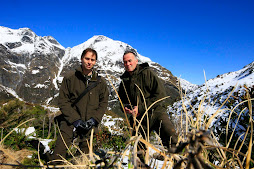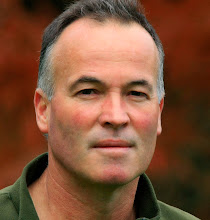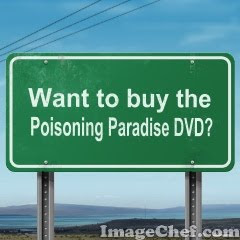"Kiwis Against Possums: A Critical Analysis of Anti-Possum Rhetoric in Aotearoa New Zealand"
It's a pleasant change to see there are still researchers out there that are prepared to present a research paper, beyond financial influence, and popular inDoCtrination.
Please click this link Kiwis Against Possums to view the paper.
Annie Potts is Co-director, New Zealand Centre for Human-Animal Studies, University of Canterbury
Monday, April 26, 2010
Thursday, April 22, 2010
movie2movie film review of Poisoning Paradise
In September, 2009, the NZ Skeptic Society awarded Poisoning Paradise with their annual Bent Spoon award. This was of course, a derogatory iniative by the Skeptics, some of whom appear to be involved with the poison industry that Poisoning Paradise threatens.
Last month, a major movie reviewer based in the Netherlands, requested a copy of Poisoning Paradise to review. This came out of the blue, and may have been a result of the news attention that Poisoning Paradise received from the Skeptic Society's Bent Spoon award.
To read that review...please click here. You can translate into English by clicking the button at the top right of the web page.
Just to note - Sir Peter Jackson's latest movie "The Lovely Bones" (2009 - budget est 65 mill IMDBpro.com) has scored 3 stars out of 5 in the ratings on this site.
Jane Campion's super movie "Bright Star" (2009 - budget est 8.5 mill - IMDBpro.com), getting 3 stars, also.
Poisoning Paradise, on its peenee, weenee budget of about $20,000, gets 3.5 out of 5!
Cool bananas!
Last month, a major movie reviewer based in the Netherlands, requested a copy of Poisoning Paradise to review. This came out of the blue, and may have been a result of the news attention that Poisoning Paradise received from the Skeptic Society's Bent Spoon award.
To read that review...please click here. You can translate into English by clicking the button at the top right of the web page.
Just to note - Sir Peter Jackson's latest movie "The Lovely Bones" (2009 - budget est 65 mill IMDBpro.com) has scored 3 stars out of 5 in the ratings on this site.
Jane Campion's super movie "Bright Star" (2009 - budget est 8.5 mill - IMDBpro.com), getting 3 stars, also.
Poisoning Paradise, on its peenee, weenee budget of about $20,000, gets 3.5 out of 5!
Cool bananas!
Reel Earth Environmental Film Festival
Poisoning Paradise is being screened at the Reel Earth Environmental Film Festival, in Palmerston North, Ist of June, at 8.00pm.
Please forward to anyone that may be interested in viewing it.
Click here to read introduction.
Please forward to anyone that may be interested in viewing it.
Click here to read introduction.
Monday, April 19, 2010
Ecocide - now punishable by law? - UK Guardian 13th April 2010
The following segment is part of a story published in the UK newspaper, the Guardian on the 13th of April, 2010.
It refers to the recent legal case initiated by Richard Dawkins and Christopher Hitchens, against the Pope.
It also raises the possibility of holding to account the perpetrators of crimes committed at a greater level, by the likes of bureaucrats and politicians, who are presently deemed exempt.
The following segment of the story refers to Ecocide - as we are currently experiencing in New Zealand, many would argue....
....At last we are waking up to what international law means. For the first time in modern history the underlying assumption of political life – that those who exercise power over us will not be judged by the same legal and moral norms as common citizens – is beginning to crack.
International law is the belated reply to one of the oldest surviving aphorisms in the English language. There are half a dozen versions, but the best-known is this: “They hang the man and flog the woman / That steals the goose from off the common / But let the greater villain loose / That steals the common from the goose.” This is the way we thought it would remain. The powerful were licenced by our expectations to carry on committing great crimes, while their subjects were punished for lesser offences. No longer. Picture the Pope awaiting trial in a British prison, and you begin to grasp the implications of the radical idea which has never yet been applied: equality before the law.
At the same time as Dawkins and Hitchens laid out their case, the barrister Polly Higgins challenged our perceptions of what legal equality means. On Friday she launched a campaign to have a fifth crime against peace recognised by the International Criminal Court(8). The crime is ecocide: the destruction of the natural world.
The laws of most nations protect property fiercely, the individual capriciously and society scarcely at all. A single murder is prosecuted; mass murder is the legitimate business of states. Only when these acts are given names – genocide, crimes against humanity, war crimes, crimes of aggression - do we begin to understand their moral significance.
The same applies to nature. The Wildlife and Countryside Act 1981 criminalises anyone who “intentionally picks” a single flower from a protected plant(9). But you can grub up as many as you like as long as it’s “an incidental result of a lawful operation.” Pick a buttonhole and you could find yourself in the dock. Plough out the whole habitat and the law can’t touch you.
Higgins gives some examples of ecocide: the tar sands mining in Alberta, the Pacific garbage patch, the pollution of the Niger Delta by oil companies(10). She points out that ecocide is rarely a crime of intent, but in most cases an incidental consequence of other policies. Company directors or politicians could be prosecuted individually(11), but instead of being fined they would be charged for the restoration of the natural systems they’ve damaged. The purpose of criminalising ecocide is to raise the costs of trashing the planet to the point at which it ceases to be worthwhile. This is the obvious outcome of a wider understanding of legal equality: why should private property be protected while the common wealth of humanity is not?
International law as currently applied is often described as victors’ justice: the only people who get prosecuted are those who lose the wars they fight with powerful states. It’s not even that. Last week we learnt that some 50 suspected war criminals or human rights abusers are living in Britain(12). Among them are alleged torturers who worked for Saddam Hussein’s government, one of Robert Mugabe’s henchman, a member of Sudan’s janjaweed militia and a gruesome collection of Afghan warlords. But the police have been given no budget to investigate them and the Crown Prosecution Service has no resources with which to pursue them. So, while shoplifters are sent down, alleged mass murderers walk freely among us.
To view the full story - Click here
It refers to the recent legal case initiated by Richard Dawkins and Christopher Hitchens, against the Pope.
It also raises the possibility of holding to account the perpetrators of crimes committed at a greater level, by the likes of bureaucrats and politicians, who are presently deemed exempt.
The following segment of the story refers to Ecocide - as we are currently experiencing in New Zealand, many would argue....
....At last we are waking up to what international law means. For the first time in modern history the underlying assumption of political life – that those who exercise power over us will not be judged by the same legal and moral norms as common citizens – is beginning to crack.
International law is the belated reply to one of the oldest surviving aphorisms in the English language. There are half a dozen versions, but the best-known is this: “They hang the man and flog the woman / That steals the goose from off the common / But let the greater villain loose / That steals the common from the goose.” This is the way we thought it would remain. The powerful were licenced by our expectations to carry on committing great crimes, while their subjects were punished for lesser offences. No longer. Picture the Pope awaiting trial in a British prison, and you begin to grasp the implications of the radical idea which has never yet been applied: equality before the law.
At the same time as Dawkins and Hitchens laid out their case, the barrister Polly Higgins challenged our perceptions of what legal equality means. On Friday she launched a campaign to have a fifth crime against peace recognised by the International Criminal Court(8). The crime is ecocide: the destruction of the natural world.
The laws of most nations protect property fiercely, the individual capriciously and society scarcely at all. A single murder is prosecuted; mass murder is the legitimate business of states. Only when these acts are given names – genocide, crimes against humanity, war crimes, crimes of aggression - do we begin to understand their moral significance.
The same applies to nature. The Wildlife and Countryside Act 1981 criminalises anyone who “intentionally picks” a single flower from a protected plant(9). But you can grub up as many as you like as long as it’s “an incidental result of a lawful operation.” Pick a buttonhole and you could find yourself in the dock. Plough out the whole habitat and the law can’t touch you.
Higgins gives some examples of ecocide: the tar sands mining in Alberta, the Pacific garbage patch, the pollution of the Niger Delta by oil companies(10). She points out that ecocide is rarely a crime of intent, but in most cases an incidental consequence of other policies. Company directors or politicians could be prosecuted individually(11), but instead of being fined they would be charged for the restoration of the natural systems they’ve damaged. The purpose of criminalising ecocide is to raise the costs of trashing the planet to the point at which it ceases to be worthwhile. This is the obvious outcome of a wider understanding of legal equality: why should private property be protected while the common wealth of humanity is not?
International law as currently applied is often described as victors’ justice: the only people who get prosecuted are those who lose the wars they fight with powerful states. It’s not even that. Last week we learnt that some 50 suspected war criminals or human rights abusers are living in Britain(12). Among them are alleged torturers who worked for Saddam Hussein’s government, one of Robert Mugabe’s henchman, a member of Sudan’s janjaweed militia and a gruesome collection of Afghan warlords. But the police have been given no budget to investigate them and the Crown Prosecution Service has no resources with which to pursue them. So, while shoplifters are sent down, alleged mass murderers walk freely among us.
To view the full story - Click here
Sunday, April 18, 2010
Poisoning Paradise makes the cut in leading NZ film festival
The leading environmental film festival in the Southern Hemisphere - Reel Earth Environmental Film Festival - has selected Poisoning Paradise as one of its official films for the 2010 festival. Out of the 200 films, from over 35 countries - 40 feature films have been selected.
The official website http://www.reelearth.org.nz/ has the full details, but here's a small snippet...
-
"The annual international festival opens with a ‘green carpet’ gala awards night at the
Regent on Broadway on Saturday 22 May. Auckland actor and
environmentalist Robyn Malcolm returns as MC along with Wellington band
The Black Seeds, plus guest presenter, photographer/filmmaker Vincent
Laforet of New York and Los Angeles." Read more at the Reel Earth website.
-
This is terrific news.
Because of the controversial content of the film, there has been strong Resistance with getting Poisoning Paradise screened in theatres, or broadcast in New Zealand.
We believe It is important that this film is viewed by as many Kiwi's as possible, and as disturbing as the production is - the content is fact, and defensible.
We believe it is only a matter of time, and New Zealand will see this extraordinary practice of indiscriminately, aerially poisoning our forests, ended, and it will finally go down in history as the the act of lunacy that it is.
The official website http://www.reelearth.org.nz/ has the full details, but here's a small snippet...
-
"The annual international festival opens with a ‘green carpet’ gala awards night at the
Regent on Broadway on Saturday 22 May. Auckland actor and
environmentalist Robyn Malcolm returns as MC along with Wellington band
The Black Seeds, plus guest presenter, photographer/filmmaker Vincent
Laforet of New York and Los Angeles." Read more at the Reel Earth website.
-
This is terrific news.
Because of the controversial content of the film, there has been strong Resistance with getting Poisoning Paradise screened in theatres, or broadcast in New Zealand.
We believe It is important that this film is viewed by as many Kiwi's as possible, and as disturbing as the production is - the content is fact, and defensible.
We believe it is only a matter of time, and New Zealand will see this extraordinary practice of indiscriminately, aerially poisoning our forests, ended, and it will finally go down in history as the the act of lunacy that it is.
Subscribe to:
Posts (Atom)






